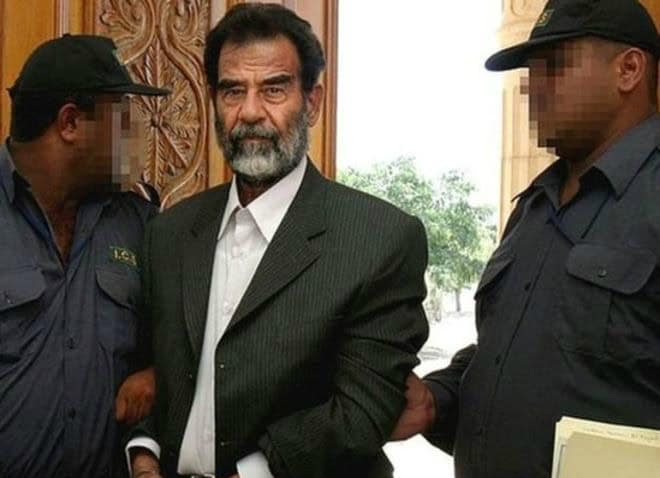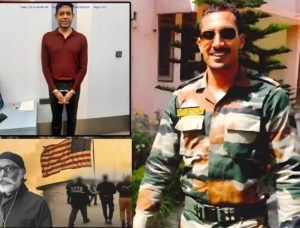A new book called The Prisoner in his Palace by Will Bardenwerper has extensively revealed the last days of Iraq’s former president Saddam Hussein in his cell.
The book has particularly discussed the former president’s relations with his 12 guards who lived with him in his last days, Will Bardenwerper being one of them.
The book reveals that there were tears in the eyes of guards when they handed Saddam to the executioners.
Will Bardenwerper says that Saddam was unfailingly polite, in jarring contrast to his murderous past.
The former dictator also surprised the guards when he enjoyed simple pleasures and seemed content spending time in his cell.
A man who once had gold plated toilets in his palaces loved to just sit outside on a patio chair or write at his desk under an Iraqi flag his guards had hung on the wall.

“Saddam took the news calmly, almost appearing to have anticipated it. He’d been sentenced to death before, he said, and it didn’t bother him” wites the author about Saddam’s reaction after the verdict to execute him was declared.
Joseph, who’d grown close to Saddam over the fifteen months they’d spent together, would later say that delivering this news was the most difficult moment of his life, since he now saw their relationship as “more of a friendship than that of criminal and translator.”
“It is God’s will, Saddam said matter-of-factly. I’m a soldier, and what God wants, God does,” Saddam said without any having any sign of regrets or grief on his face.
The author writes: “As the soldiers went about their daily tasks, they had an abstract understanding that their time with Saddam would shortly be over, but, having never participated in an execution before, the gravity of the situation hadn’t really sunk in. It somehow didn’t seem real that this charismatic older man, with whom they’d spent so much time, would soon be dead. Other than a bad back and some creaky bones, he seemed fine.”
It wasn’t until the day before the execution, Friday, December 29, that they learned the mission was a go. Saddam had just enjoyed what would turn out to be his last meal, eagerly devouring the lobster tails that the soldiers had delivered to him from the Coalition Café dining facility on Camp Victory. Saddam had gained weight while in custody, and at one point jokingly lamented that he’d gotten “fat like an American.”
Saddam liked to smoke Cohiba cigars, which he stored in an empty box of wet wipes. Years earlier Fidel Castro had taught him how to smoke them.
He always listened to the radio and would ‘always stop tuning if he stumbled across a Mary J Blige song’, the book says.
Mr Bardenwerper writes that Saddam loved the scrubby prison garden and was ‘treating them more like beautiful flowers than the ugly growths they were’.
Saddam’s fondness for sweets was disarming and the book says that he could ‘yield to the siren call of a sugary muffin the way anyone else might’.
Mr Bardenwerper writes that Saddam was meticulous about his food, too. He ate his breakfast in sections, first an omelet, then a muffin, followed by fresh fruit. If the omelet was ‘torn’ he would reject it.
Uday – who was known for psychotic outbursts – had shot up a party, killing several people and wounding several more including Saddam’s half-brother.
Saddam told his guards: ‘I was very angry with him so I burned all his cars’, referring to his son’s vast collection of Rolls-Royces, Ferraris and Porsches.
The book says: “Laughing wildly, the former dictator recalled how he gleefully watched the inferno.”

Mr Bardenwerper says that it reminded one guard of ‘a Jerry Springer episode on steroids’.
In the book the US soldier admits that Saddam’s behaviour could all have been an act, or it could have been a ‘genuine human connection’ – but he will never be able to tell.
Perhaps the most surprising aspect of the book is that Saddam’s American soldier guards grieved for him when he was executed, even though he was the sworn enemy of the US.
Specialist Adam Rogerson told Mr Bardenwerper: ‘I feel like I let him down. It was as if he had lost a family member. I almost feel like a murderer, like I killed a guy I was close to.’
After Saddam’s execution he was taken out of the execution chamber where a crowd began to spit on his body and beat him.
Mr Bardenwerper writes that the 12 American guards who had spent months watching over him were appalled.
The book says that one tried to launch himself into the crowd but was held back by his colleagues. The reason was that Saddam became so close to the guards that they regarded him as a grandfather-like figure
When Ellis, a military nurse, told him about the death of his brother Saddam offered him a hug and said: ‘I will be your brother.’
Saddam also told one of his guards that he would pay for his son’s college education if he could get access to the money.














